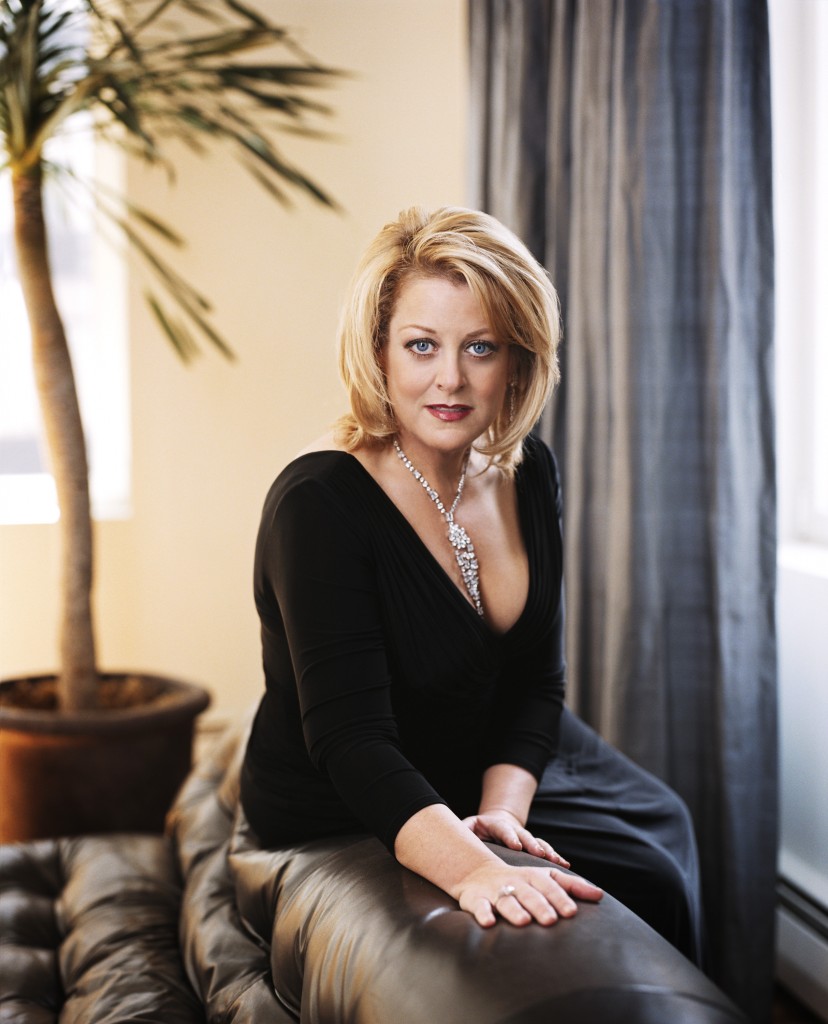Deborah Voigt offers an intimate evening of music and biography
“Art didn’t get me sober or make me thin, it fed my soul,” Deborah Voigt told the audience seated in Calderwood Pavilion’s Wimberly Theatre Friday night.
The soprano’s show, “Voigt Lessons,” presented by the Celebrity Series, is her life story in music. The ninety-minute one-woman autobiographical show, put together by the soprano, Terrence McNally, and Francesca Zambello, both known for their work on Broadway and other venues, is a charming, candid, and emotional rollercoaster ride detailing the singer’s rise from a strict Baptist upbringing in the western United States to international operatic fame.
Voigt rose to prominence in the early 1990s, feted for her dark-voiced and powerful roles in Strauss’ Ariadne auf Naxos and Elektra as well as Verdi’s Un ballo in maschera. In recent years, her performances as Brünnhilde in Robert Lepage’s production of Wagner’s Ring at the Met have received mixed reviews. This spring, the soprano will make her role debut as Marie, opposite baritone Thomas Hampson, in the company’s production of Berg’s Wozzeck.
Changes to the voice over one’s career are a reality for any opera singer, and the evolving qualities of Voigt’s soprano have lately made headlines. In early September, she cancelled her performance in Washington National Opera’s Tristan and Isolde. She has since said that she may phase out such stentorian roles from her repertoire.
But with both the heavy and light fare in “Voigt Lessons” Friday night, her singing was flexible and relaxed. Musically, the show is a potpourri of arias by Strauss, Puccini, and Wagner, songs by Brahms, Stephen Foster, and Nat King Cole, as well as selections from Voigt’s roots, American musical theater. Through it all, pianist Kevin Stites proved a capable and sensitive accompanist, able to sweeten and thicken his touch for the show’s wide-range of music.
The singer’s coquettish stage presence and the direct humor of her tales sparked laugher. She told how she still gets an “icky” feeling when mentioning her Southern California hometown–Placentia. She referred to the Dogpatch girls in Li’l Abner–her first stage role–as the Rhinemaidens of musical theater. And when she first began studying opera at California State University at Fullerton, Voigt told her teacher, Jane Paul, that she wanted to sing Puccini’s Nessun Dorma from Turandot before learning that it was tenor aria. Friday night, Voigt sang it anyway, her voice rosy and robust even for a tongue-in-cheek rendition rife with fiercely-rolled rs.
Her teenage years in Southern California were difficult, Voigt recalled, but the music of Karen Carpenter was her guardian angel. A Song for You, which framed her telling of her life as a diva, glowed with warmth and supple flow. She sang Rodgers and Hammerstein’s Edelweiss, a favorite of her grandfather’s, and Henry Mancini’s Moon River with equal tenderness. For the gospel songs In the Palm of My Hand and His Eye is on the Sparrow, reflecting music she performed as a young singer in church, Voigt performed with a milky vocal tone and explored an emotional range well-suited to any operatic aria.
She also told of her meteoric success in singing competitions, winning the Gold Medal at the Tchaikovsky Competition, her audition at the Met, and numerous others. The mood dimmed when she finally came to her long struggle with her weight and eating disorder. At her heaviest, Voigt weighed 333 pounds—three numbers she said she will never forget. Her weight attracted media attention when, in 2004, the Royal Opera House removed her from the lead in Strauss’s Ariadne to much criticism because she was unable to fit into a size-one cocktail dress. (Voigt went on to have gastric bypass surgery). Her size wasn’t a problem for Boston Lyric Opera, she told the audience, and her performance in the 1991 production earned her critical acclaim.
Her weight also wasn’t an issue for her high-school sweetheart and eventual husband, John Leitch, whom she described as a “chubby chaser.” Her eyes twinkled as she recalled how the first time they met. She was 16. He was 21. Some of Voigt’s richest singing of the evening came when she performed Brahms’ Von ewiger Liebe from Op. 43, a deep and emotional song that tells of the unbreakable love between a young boy and girl. That’s how she remembered much of their twenty-year marriage. She referred to him as “Mr. Wonderful.”
But the relationship came to a heart-rending conclusion. Attempting to put inner demons at rest over the break-up, the singer began drinking, and, on one occasion, blacked out for 36 hours, the amount of time it takes to hear two Ring Cycles. As a soundtrack to her confessional, Voigt offered a touching performance of Nat King Cole’s Smile. In some verses, her voice achieved a glowing luster, reflecting pride in her professional successes. In others, her tone softened and quivered the singer almost in tears as she reflected the heartbreaks of her personal life. She said that she even contemplated suicide.
“Hello, I’m Debby and I’m an alcoholic” are the words that saved her life, Voigt recalled. She followed with a reverent performance of Strauss’s Zueignung, her voice aglow in tones of genuine thanksgiving.
“The not-so-fat-anymore lady has sung,” Voigt said to close. At this point in her story, she is looking ahead to the future.
Deborah Voigt will return for a Celebrity Series recital with songs by Amy Beach, Richard Strauss, Respighi, Tchaikovsky, and Bernstein, accompanied by pianist Brian Reger April 27 at Symphony Hall. For the next Celebrity Series event, pianist Marc-André Hamelin will perform his own Barcarolle along with music by Medtner and Schubert 3 p.m. December 8 at Jordan Hall. celebrityseries.org; 617-482-2595
Posted in Performances




